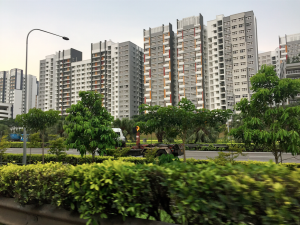This Labour Day, workers have to consider if they should continue to lock away huge sums of money in their property, when monetising flats becomes more and more difficult in the future. In her 2nd IPS-Nathan lecture, Dr Cheong Koon Hean said that 99 year leases allow the Government to recycle land, so as to keep public housing affordable for future generations. But the question for Dr Cheong who is the chief executive of Housing Board really is, “at what cost?”
 Let’s say a person (Mr X) buys a 4-room Built-To-Order (BTO) flat at $300,000, soon after he gets married at between 32 – 35 years of age; assuming he takes HDB loan at 2.6% per annum and takes up a 30-year mortgage; and suppose he stays in the same flat throughout the mortgage period; he would have come close to reaching retirement age at this time, and his flat would have about 69 years left on its lease.
Let’s say a person (Mr X) buys a 4-room Built-To-Order (BTO) flat at $300,000, soon after he gets married at between 32 – 35 years of age; assuming he takes HDB loan at 2.6% per annum and takes up a 30-year mortgage; and suppose he stays in the same flat throughout the mortgage period; he would have come close to reaching retirement age at this time, and his flat would have about 69 years left on its lease.
If he decides to sell his flat at this time, he may face difficulties, as the buyer of this flat will be mindful of the restrictions which will kick-in once the flat reaches below 60-years. Even if he manages to find a buyer for his flat, the new buyer will actually be purchasing into household equity destruction.
https://www.icompareloan.com/resources/99-year-leasehold-hdb-time-bomb/
One argument is that Mr X can continue to monetise his flat by renting it out. Dr Cheong did argue for this at her lecture. But with home ownership already at the 90 per cent level in Singapore (where on average every local has 1.1 homes on average) who will rent Mr X’s flat?
International Property Advisor Ku Swee Yong made a similar point in speaking to MoneyFM 89.3. He noted, “last year, we lost 36,000 workers who are on work passes in Singapore. And then in the last few quarters we are still seeing overall shrinkage of the total number of jobs in Singapore. I am concerned that on the tenancy front, things may get a little bit tougher for you to secure good paying tenants.”
What this also means is that with most people’s Central Provident Fund (CPF) meant primarily for retirement locked in the flats, they will have very little left in older age when they are less-able to work. And even this will be depreciating year-after-year.
https://www.icompareloan.com/resources/hdb-loans-now-expensive-bank-loans-almost-decade/
This Labour Day, this is the hot-button topic for many workers in Singapore, who are also home owners.
According to the Ministry of Manpower’s (MOM) Labour Market Advance Release First Quarter 2018, released on 27 April, total employment decreased by 12,800 jobs from 1 January 2017 to 31 March 2018. It is unclear how many from that number are Singaporeans.
The negative sentiment in the local jobs market will have an impact on the property sector and in monetising flats, as buyers may become a lot more circumspect.
Ku makes similar observations in his interview and said, “(if) employment remains weak, some of the home owners may be unable to pay their mortgages and would then have to let go of their properties in the auction market. And that could mean a little bit of pain while the rest of the market may still be exuberant.”
This Labour Day, workers in Singapore (most of whom are home owners), have very important questions to ask of themselves:
“Should we continue to lock away large sums of money in our properties when monetising flats becomes more difficult in our old age?”
“Should we rethink an appropriate lease period for public housing and consider adding affordable rental housing into the mix of options for Singaporeans?”
—
If you are home-hunting, our Panel of Property agents and the mortgage consultants at icompareloan.com can help you with affordability assessment and a promotional home loan. Just email our chief mortgage consultant, Paul Ho, with your name, email and phone number at paul@icompareloan.com.





